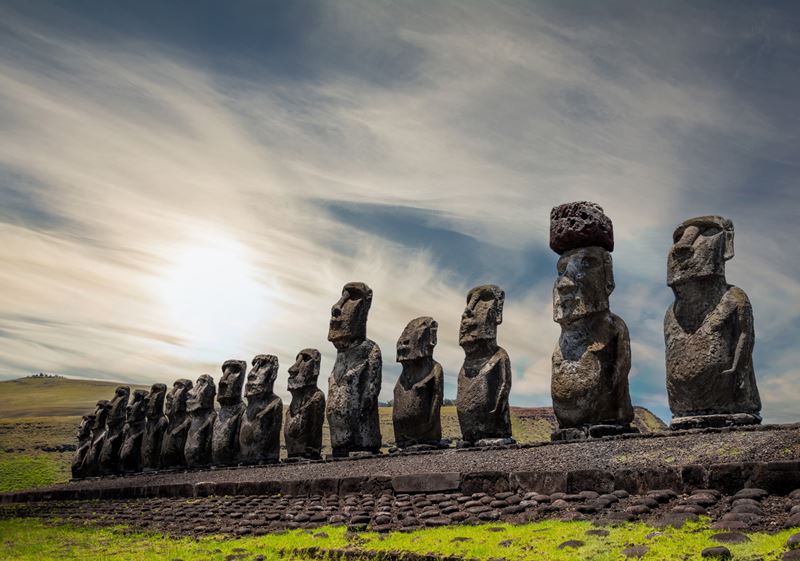Chile Expands Wine Empire to Easter Island
Rapa Nui Gain DO Status as Chile Expands Wine Production
2024-08-08

In an ambitious move to expand its wine-producing regions, Chile has officially designated Easter Island and the Chiloé Archipelago as new Denominations of Origin (DO). This development not only highlights the country's innovative approach to viticulture but also taps into the unique cultural and geographical heritage of these remote locations.
Easter Island, known worldwide for its iconic Moai statues, will now also be recognized as the DO Rapa Nui. The name honors both the island and its indigenous people, who have long been stewards of this remote territory located some 3,500 kilometers off the coast of central Chile. This new designation is part of a broader strategy to promote Chilean wines, particularly in regions that have historically been considered unsuitable for viticulture. The DO Rapa Nui is expected to enhance the island's growing reputation as a tourist destination by adding a new dimension: enotourism.
Similarly, Chiloé, an archipelago located in the southern region of Patagonia, has been granted its own Denomination of Origin. The DO Chiloé reflects the region's emerging status as a wine-producing area, a surprising development given its traditionally cold climate. Both of these new DOs are poised to offer wine enthusiasts and tourists alike an opportunity to explore Chile's diverse landscapes through their palates.
The expansion of wine production into these new regions has been driven by several factors, with climate change playing a central role. Warmer temperatures have made it feasible to cultivate vineyards in areas once deemed too cold for such endeavors. Chilean winemakers, known for their adaptability and innovation, have embraced this challenge, pushing the boundaries of viticulture in the country.
Alfonso Undurraga, president of the national organization Vinos de Chile, emphasized the significance of these new DOs for both the wine industry and tourism. He noted that as traditional wine-producing regions face increasing challenges due to shifting climate patterns, these new areas offer fresh opportunities. The official recognition of DO Rapa Nui and DO Chiloé underscores Chile's proactive approach to addressing the realities of climate change while also showcasing the country's commitment to preserving its cultural and natural heritage.
José Mingo, a key figure in the Chilean wine industry and one of the pioneering commercial wine producers on Easter Island, shared his perspective on the significance of this milestone. In an interview with Wine Independent Press, Mingo discussed the origins of the project, which began as a dream to produce wine on the island with the full involvement of the local community. The goal was not just to grow grapes but to do so in a way that respected and incorporated the island's unique cultural practices and environmental conditions.
Mingo explained that the pursuit of the Denomination of Origin status for Rapa Nui wines began last year. The realization of this goal marks a significant achievement, one that he hopes will bring both economic benefits to the island and greater recognition of its potential as a wine-producing region.
The government's decree that established these new DOs also included the approval of 41 additional grape varieties for cultivation in Chile. This expansion brings the total number of permitted grape varieties in the country to 88, reflecting the growing diversity of Chilean viticulture. Among the newly approved varieties are Chasselas, Garnacha Blanca, Fiano, Garganega, Greco di Tufo, Gamay, Mencía, Aglianico, Dolcetto, and Montepulciano. Wines made from these grapes will be able to carry the specific DO on their labels, offering consumers a clearer understanding of the wine's origin and character.
This diversification is particularly important as Chile continues to position itself as a global leader in the wine industry. The inclusion of these new grape varieties not only enhances the complexity and richness of Chilean wines but also provides winemakers with the tools they need to adapt to changing climate conditions and market demands.
The creation of the DO Rapa Nui and DO Chiloé is a testament to the dynamism of the Chilean wine industry. As traditional wine regions grapple with the impacts of climate change, the emergence of new areas like Easter Island and Chiloé offers a glimpse into the future of viticulture. These regions, with their unique climates, landscapes, and cultural histories, are poised to add exciting new dimensions to the world of wine.
For Chile, a country with a rich wine heritage, the expansion into these uncharted territories is both a challenge and an opportunity. By embracing innovation and honoring its diverse geography, Chile continues to carve out a distinctive place for itself in the global wine market. As wine lovers explore the offerings from these newly recognized regions, they will not only be tasting the fruits of the vine but also the stories of the land and its people.
Founded in 2007, Vinetur® is a registered trademark of VGSC S.L. with a long history in the wine industry.
VGSC, S.L. with VAT number B70255591 is a spanish company legally registered in the Commercial Register of the city of Santiago de Compostela, with registration number: Bulletin 181, Reference 356049 in Volume 13, Page 107, Section 6, Sheet 45028, Entry 2.
Email: [email protected]
Headquarters and offices located in Vilagarcia de Arousa, Spain.